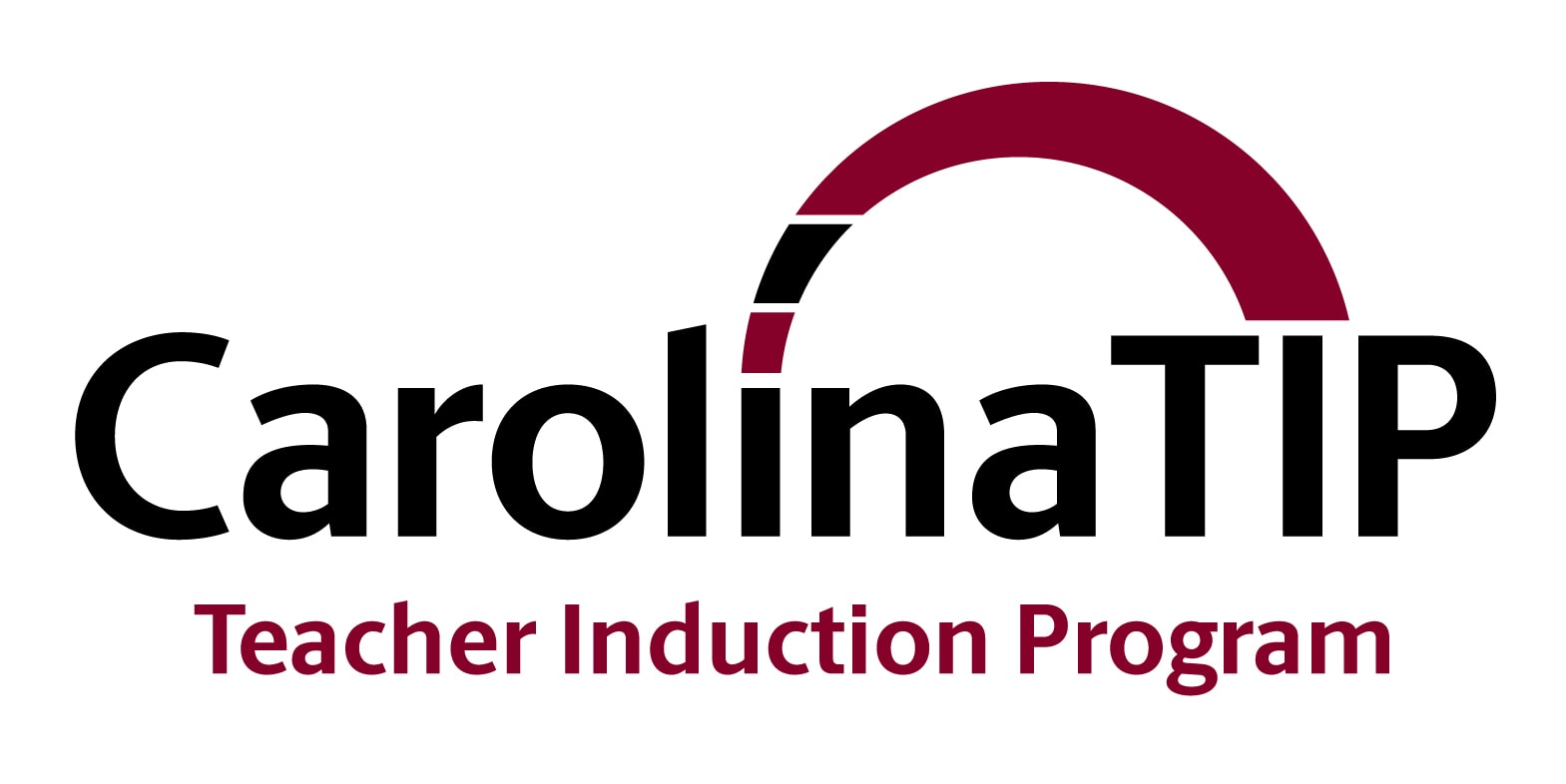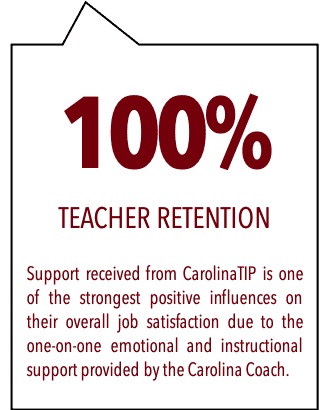By Nicole Skeen, University Induction Coordinator | UofSC College of Education
When my husband and I found out we were expecting, we did everything in our power to prepare. We read books, attended classes, and sought the advice of experts. Over weekends, we even borrowed our friends’ children in an attempt to hone our pre-parenting skills. Unsurprisingly, as any parent knows, nothing (and I mean nothing!) could have prepared us for the fatigue, concern, stress, and self-doubt that stems from the reality of raising three boys.
 For teachers, the journey of stepping into their own classrooms for the first time follows much the same trajectory of bewilderment and exhaustion faced by new parents. Many enter the profession with the tools and knowledge required for success. However, new teachers often find themselves at a loss for how to effectively wield these tools as they learn how to make more than 1,500 decisions per day, navigate the needs of 20 to 30 students simultaneously, assimilate into a school culture, and balance increasing demands – all without breaking under the pressures of accountability mandates. The numerous challenges new teachers face are substantiated by a myriad of research and data including:
For teachers, the journey of stepping into their own classrooms for the first time follows much the same trajectory of bewilderment and exhaustion faced by new parents. Many enter the profession with the tools and knowledge required for success. However, new teachers often find themselves at a loss for how to effectively wield these tools as they learn how to make more than 1,500 decisions per day, navigate the needs of 20 to 30 students simultaneously, assimilate into a school culture, and balance increasing demands – all without breaking under the pressures of accountability mandates. The numerous challenges new teachers face are substantiated by a myriad of research and data including:
- Studies that show the need for and promise of induction support models (Bastian & Marks, 2017; Ronfeldt & McQueen, 2017);
- Research that points to job stress, job satisfaction, and a diminished sense of self-efficacy as early indicators a teacher will leave the profession (Dicke et al, 2014; Hong, 2010; Tait, 2008; Zee & Koomen, 2016); and
- South Carolina’s teacher shortage crisis as illustrated in Patrick Kelly’s The House is on Fire.

At least 17 % of teachers leave the profession altogether within the first five years of teaching (Gray & Taie, 2015). In South Carolina, the situation is equally dire. A total of 5,300 SC teachers exited the profession at the end of the 2017-2018 school year. Almost half of those leaving the profession were induction teachers with five or fewer years’ experience. Alarmingly, a full quarter of first year teachers left the classroom during or at the end of the 2017-2018 school year (CERRA, 2018). These numbers paint a grim picture. One that reveals an urgent need to identify and provide the type of support required to not only keep our newest teachers in the classroom but also enable them to cultivate the confidence, resiliency, and grit needed to thrive in the profession.
Simply put, the essential question is: How can we support teachers through the inherent growing pains of their induction years in order to unlock their full promise and potential in the classroom?
The University of South Carolina College of Education’s Carolina Teacher Induction Program (CarolinaTIP) is making strides toward answering this critical question. In its third iteration, the university-based induction program currently provides supplemental, comprehensive, holistic, and teacher-centered support to more than 100 teachers across six school districts.
Read more about the program in the news:
A Case for Teacher Mentoring, Coaching and Induction Support by Dr. Jon Pedersen
Survive to Thrive by Craig Brandhorst
Columbia Business Report Article
The foundation of CarolinaTIP rests on two core beliefs:
- Teachers require support that meets the evolving professional needs of the novice educator, provides personalized and responsive coaching, and strategically guides teachers through the journey of uncovering their unique teacher identity while growing their comprehensive capacity.
- Teachers deserve support that is teacher-centered, focused beyond the needs of the students to intentionally target the needs of the teacher and designed to provide holistic support aimed at increasing overall wellness, self-efficacy, and resiliency.
These beliefs are manifested throughout the program in whole-group training sessions strategically designed to intersect with the developmental readiness of induction teachers, in-class support from an assigned Carolina Coach, and tiered responsive coaching intended to meet the individual teacher’s professional and emotional needs.
The Research, Evaluation and Measurement (REM) Center is conducting an external evaluation of the program’s effectiveness. Recognizing the following as precursors to teachers leaving the profession, REM Center evaluators are collecting data on a combination of teacher-efficacy, job satisfaction, job stress, and teacher attendance to measure CarolinaTIP’s progress toward meeting its ultimate goal of increasing teacher retention. The following represent key findings about CarolinaTIP from two years of program evaluation informed by interviews, focus groups, surveys, and a synthesis of all data collected:
- Evidence of CarolinaTIP’s effectiveness is emerging. With an expanded number of teachers and a growing coaching team,
 CarolinaTIP is increasingly demonstrating its effectiveness in retaining teachers and growing their professional capacity as early career professionals. Furthermore, evidence indicating that the program positively influences teachers’ self-efficacy, job stress, and job satisfaction is continuing to grow.
CarolinaTIP is increasingly demonstrating its effectiveness in retaining teachers and growing their professional capacity as early career professionals. Furthermore, evidence indicating that the program positively influences teachers’ self-efficacy, job stress, and job satisfaction is continuing to grow. - The external nature of support and the centrality of personal relationships are the essence of CarolinaTIP. Participants and coaches consistently report that the program being independent of teachers’ employers was a key aspect of what makes the program valuable. This, paired with the program’s commitment to building strong personal relationships steeped in empathy, is what makes the program distinct.
- CarolinaTIP support is highly valued by participating teachers. Across all data sources, teachers express deep appreciation for the support they receive through CarolinaTIP. Many note making decisions about where to teach based on whether the school is partnered with CarolinaTIP and many exiting the program expressed regret that they could no longer participate due to lack of partnership with their new school.
- CarolinaTIP’s encouragement of self-reflection is growing reflective practitioners. While some participants initially noted a desire for more directive feedback and precise solutions, teachers who have been engaged in CarolinaTIP for a longer period of time have come to value the process of reflecting and deriving their own solutions.
- Emotional support and personalized mentoring are vital elements of the program. Teachers indicate that the emotional support they receive has been essential in helping them survive their first year and stabilize their practice during their second year in the classroom. Personal coaching that is adaptive to the strengths, needs, and personality of the individual teacher is one of the components that sets CarolinaTIP coaching apart.

Madalyn Hazlett’s story details how CarolinaTIP impacted her experience as a new teacher in her powerful first-person narrative.
While the emerging evidence of the program’s effectiveness and high retention rates of its teachers are encouraging, the program’s positive day-to-day impact on participating teachers is the most convincing evidence that CarolinaTIP is a promising solution to the teacher shortage crisis.
“CarolinaTIP is such a powerful solution to the alarming rate that we are losing teachers in the profession. Teaching is not for the faint of heart. My coach’s joy, passion, transparency, and love of teaching inspire me to keep fighting and keep teaching. She reminds me of the love I found in this profession, and she has helped me see the big picture. I can’t drown with a life preserver like CarolinaTIP.”
Madalyn Hazlett’s story details how CarolinaTIP impacted her experience as a new teacher in her powerful first-person narrative.
While nothing could have prepared my husband and me for the challenges (or the noise) that come with raising children, there was also no way we could have anticipated the sheer joy of watching our boys grow. Even still, there are times we need to be reminded to look beyond our current stress and struggle to see the hope and promise of the future. With so much negativity dictating the narrative around teaching, the underlying goal of CarolinaTIP is to whisper an alternative narrative directly into the ears of new teachers. To provide a narrative that resonates over the noise and speaks to the joy of being an educator; one that assures teachers that they can succeed, and they are not alone in their journey.
References
Bastian, K.C. & Marks, J.T. (2017). Connecting teacher preparation to teacher induction: Outcomes for beginning teachers in a university-based support program in low-performing schools. American Educational Research Journal, 54(2), 360-394. doi: 10.3102/0002831217690517.
CERRA (2019, January). South Carolina Annual Educator Supply and Demand Report (2018-2019 School Year). Center for Educator Recruitment, Retention, and Advancement. Rock Hill, SC.
Dicke, T., Parker, P.D., Marsh, H.W., Kunter, M., Schmeck, A., & Leutner, D. (2014). Self-efficacy in classroom management, classroom disturbances, and emotional exhaustion: A moderated mediation analysis of teacher candidates. Journal of Educational Psychology, 106(2), 569-583. doi: 10.1037/a0035504.
Gray, L.,, Taie, S. (2015). Public School Teacher Attrition and Mobility in the First Five Years: Results From the First Through Fifth Waves of the 2007–08 Beginning Teacher Longitudinal Study (NCES 2015-337). U.S. Department of Education. Washington, DC: National Center for Education Statistics. Retrieved March 29, 2019 from http://nces.ed.gov/pubsearch
Hong, J.Y. (2010). Pre-service and beginning teachers’ professional identity and its relation to dropping out of the profession. Teaching and Teacher Education, 26, 1510-1543. doi: 10.1016/j.tate.2010.06.003
Ronfeldt, M. & McQueen, K. (2017). Does new teacher induction really improve retention? Journal of Teacher Education, 684), 394-410. doi: 10.1177/0022487117702583.
Tait, M., (2008). Resilience as a contributor to novice teacher success, commitment, and retention. Teacher Education Quarterly, 35(4), 57-75.
Zee, M., & Koomen, H. M. (2016). Teacher self-efficacy and its effects on classroom processes, student academic adjustment, and teacher well-being: A synthesis of 40 years of research. Review of Educational Research, 86(4), 981-1015.